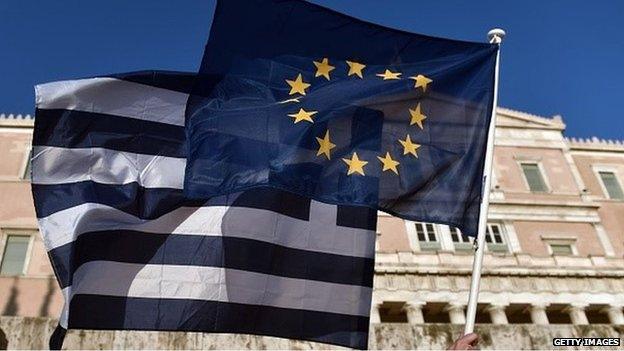All Greek to you? Greece's debt jargon explained
- Published

The Greek debt crisis has spawned its own lexicon of jargon, including "Greferendum" and "Paperology"
Don't know your Drachma from your Troika? Here we explain some of the Greek debt crisis jargon you may have read, but not recognised.
Austerity: Europe-wide economic policy of reducing government spending to reduce deficit or borrowing. Austerity measures were implemented in Greece as a condition of bailout loans, but rejected by its new anti-austerity government in January.
Debt relief: Debt relief can mean a number of things: the forgiveness of all or part of the debt; a cut in the interest rate paid on the debt; or a temporary halt to the repayment of the debt. It can also include a extension of the period over which the debt is repaid (known as debt restructuring).
Drachma: Greek currency before it was replaced by euro in 2001. The word translates as "handful". One of the world's earliest currencies, and the oldest in Europe, the drachma, external dates back as far as 1,100BC. It could soon make a hasty comeback.

The Greek drachma, Europe's oldest currency, could soon make a hasty comeback
ECB: European Central Bank. The ECB is the central bank of the eurozone and is responsible for setting the currency's monetary policy. It is owed about 6% of Greece's overall debt.
ELA: Emergency Liquidity Assistance. Emergency cash, in effect, loaned to Greece by the ECB to make sure Greek banks stay afloat while the country negotiates with its creditors.
ESM: European Stability Mechanism. The ESM is the eurozone's rescue fund. It can provide countries in financial difficulty with up to €500 billion (£355bn; $560bn). Greece has requested an ESM bailout to cover all its financial needs for two years.
Eurozone: The group of 19 EU countries that share a common currency - the euro. Has so far weathered the financial crisis and kept Greece within the currency, but there are serious fears about the future of the currency should Greece exit.
Exposure: Almost all the eurozone countries have lent money to Greece, leaving them "exposed" if Greece can't pay. The eurozone's largest economies, Germany and France, are owed the most but countries with smaller or less robust economies, such as Slovenia and Spain, would likely suffer more.
Grexit: Short for "Greek exit" from the eurozone. First coined by financial analysts in 2012 and now a real and looming possibility. Not to be confused with "Brexit" - the possibility of Britain leaving the EU.
Greferendum: Another handy portmanteau - short for "Greek referendum". A controversial vote was held on 5 July, when more than 60% of Greek voters said No to the austerity conditions imposed by Greece's creditors. It was a triumph for Prime Minister Alexis Tsipras - though any new bailout deal is likely to mean more painful austerity.

Greek debt had a "haircut" back in 2011
Haircut: A reduction in the value of a troubled borrower's debts. In 2011, Greece's private lenders received a massive 50% haircut of what they were owed, reducing Greece's debt by €100bn (£70bn; $110bn). Greece pushed for a second debt haircut this year but has failed to reach an agreement with its creditors.
IMF: The International Monetary Fund. Set up after World War Two to provide financial assistance to governments, the IMF is responsible for providing rescue loans to countries that run into debt problems. Since the 2008 financial crisis it has bailed out Greece, Ireland and Portugal.
Paperology: The exchange of documents between Greece and its EU negotiating partners has gone on for so long with no breakthrough that it has been given its own name - "paperology".
Troika: A Russian word meaning a group of three, used by Greek journalists and then others to describe the EU, ECB, and IMF - the trinity of institutions responsible for monitoring Greece's austerity measures. Prime Minister Tsipras vowed in February that he would no longer acknowledge the "Troika" as an entity.